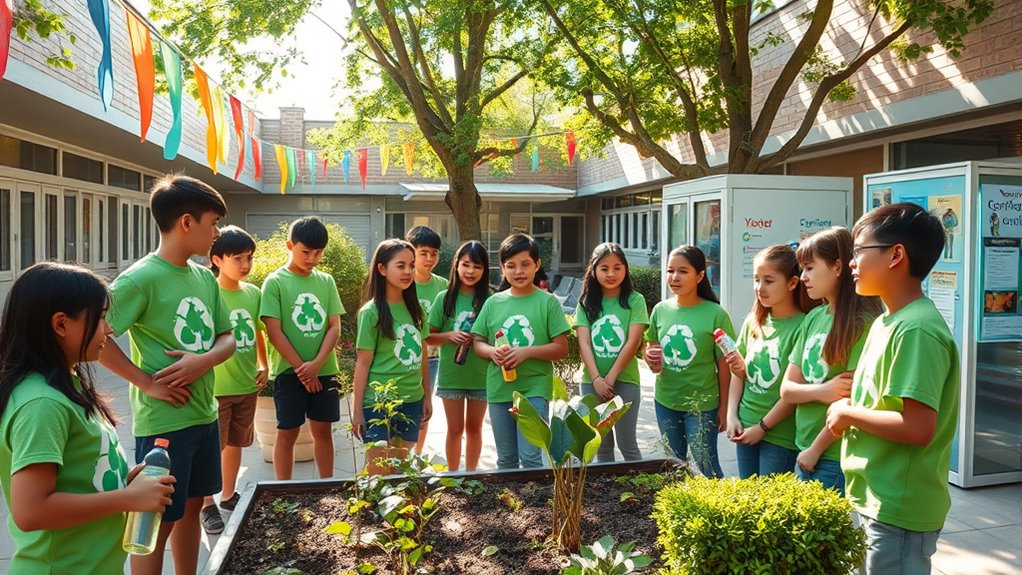Getting involved in environmental clubs and eco-teams puts you at the forefront of inspiring change in your school and community. You’ll develop skills like teamwork, leadership, and project management while leading conservation initiatives, campaigns, and community projects. Your efforts can reduce waste, promote eco-friendly habits, and raise awareness about sustainability. Taking part allows you to make a real difference and build lasting relationships, all while gaining valuable experience—discover how you can lead impactful projects by exploring further.
Key Takeaways
- Student-led environmental clubs foster leadership skills through planning and executing sustainability projects.
- Eco-teams promote teamwork and collaboration to implement conservation initiatives in schools.
- Leadership in eco-teams inspires peer engagement and community awareness about environmental issues.
- Student leaders develop practical skills like project management, communication, and problem-solving.
- Eco-team involvement creates lasting community impact by championing eco-friendly habits and conservation efforts.

Environmental clubs and eco-teams are powerful ways for students to make a positive impact on their communities and the planet. When you get involved, you have the opportunity to promote sustainable practices that help reduce your school’s carbon footprint and foster eco-friendly habits among peers. These groups often focus on implementing conservation projects that protect local natural resources, such as organizing recycling drives, planting trees, or creating community gardens. By participating in these initiatives, you actively contribute to the preservation of the environment and demonstrate leadership that can inspire others to follow suit.
Joining an environmental club or eco-team puts you at the forefront of meaningful change. You can learn how to identify environmental issues and develop practical solutions. For example, your team might initiate a campaign to minimize single-use plastics in your school or advocate for energy-efficient lighting. These efforts not only benefit the environment but also teach valuable skills like teamwork, project management, and communication. As you work on conservation projects, you gain firsthand experience in planning, organizing, and executing initiatives that have tangible results. This hands-on approach makes your contributions more impactful and memorable.
Joining an eco-team helps develop practical skills and creates real environmental impact through conservation projects.
Moreover, being part of an eco-team allows you to foster a sense of community and shared responsibility. When you collaborate with classmates, teachers, and local organizations, you build relationships centered around a common goal: protecting the environment. This collective effort amplifies your impact, as more people become aware of sustainable practices and conservation projects. Your leadership can motivate others to adopt eco-friendly habits, such as reducing waste, conserving water, or biking instead of driving. These small changes, when multiplied across your school and community, lead to significant environmental benefits. Additionally, understanding the role of projectors and their features, such as contrast ratio and color accuracy, can be crucial when creating engaging presentations for awareness campaigns.
Participation in environmental advocacy can also enhance your understanding of broader environmental issues, helping you develop a more comprehensive perspective on sustainability challenges. Learning about how sustainable practices can be implemented in everyday life empowers you to make informed decisions and lead by example. Exploring different methods of conservation techniques can further strengthen your initiatives and inspire innovative solutions. Incorporating aesthetic home decor ideas into your projects—such as using recycled materials for displays or eco-friendly posters—can make your campaigns more visually appealing and memorable. By taking initiative, you demonstrate that student leadership can drive meaningful progress toward a greener future.
In essence, joining or leading an environmental club empowers you to champion sustainable practices and conservation projects that matter. You develop skills, make lasting connections, and leave a positive mark on your community. Your efforts not only help protect the environment but also inspire others to become responsible stewards of the planet. Through your dedication, you become a crucial part of the movement toward a more sustainable world.
Frequently Asked Questions
How Can Students Start an Environmental Club From Scratch?
Starting a club from scratch is exciting. First, you need strong club branding—create a compelling name and mission to attract members. Then, recruit volunteers by sharing your passion and organizing events. Focus on clear volunteer coordination, assigning roles to keep everyone engaged and organized. With a clear plan, enthusiasm, and teamwork, you’ll build a successful club that makes a real impact in your community.
What Are Effective Ways to Recruit New Eco-Team Members?
They say, “The early bird catches the worm,” so start early with your recruitment. To attract new eco-team members, focus on peer outreach by talking to classmates and teachers, sharing your passion. Use social media to spread the word—post engaging content, event updates, and success stories. Be enthusiastic and approachable, making it easy for others to see how they can contribute. This proactive approach helps build a strong, motivated team.
How Do Clubs Secure Funding for Environmental Projects?
To secure funding for environmental projects, you should explore various fundraising strategies like organizing events, selling eco-friendly products, or seeking donations from local businesses. Additionally, applying for grants can provide essential support—research relevant grant opportunities and submit compelling applications. Combining these approaches increases your chances of gaining the necessary funds to successfully carry out your environmental initiatives and make a positive impact.
What Role Do Teachers and Staff Play in Supporting Eco-Teams?
Oh, sure, teachers and staff are just there to watch from the sidelines, right? In reality, their involvement is essential. Teacher involvement and staff support empower eco-teams, providing guidance, resources, and encouragement. They help turn student ideas into action, ensuring projects succeed. Without their active participation, eco-teams might just be a fleeting idea rather than a powerful force for change in your school.
How Can Clubs Measure Their Environmental Impact Over Time?
You can measure your environmental impact over time by tracking your carbon footprint and using sustainability metrics. Regularly record energy and water usage, waste reduction, and recycling rates, then compare these figures monthly or yearly. This helps you see progress and identify areas for improvement. Implement tools like environmental audit checklists or apps to make tracking easier, ensuring your efforts lead to meaningful, measurable change toward sustainability.
Conclusion
By joining environmental clubs or eco-teams, you become a essential part of creating positive change in your school and community. You develop leadership skills, raise awareness, and inspire others to care about the planet. Isn’t it worth taking action now to protect our environment for future generations? Every small effort you make can lead to big impacts. So, why not step up and lead the way toward a more sustainable world?










